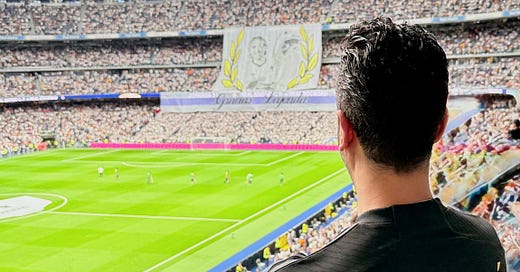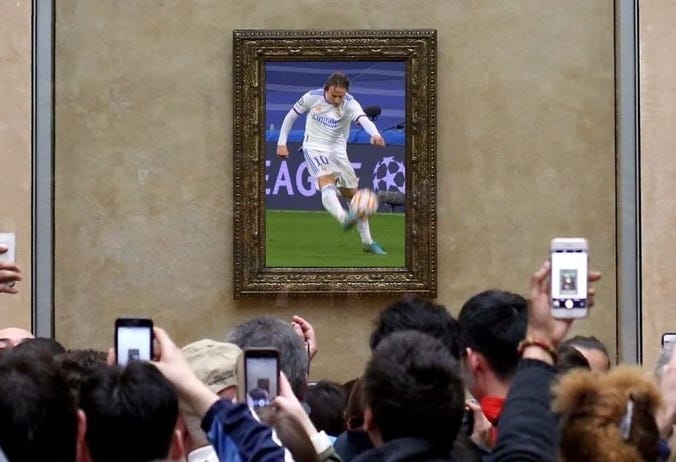The Artist Who Played Football: A Tribute to Luka Modrić
This isn’t the usual Business Artistry newsletter.
But it is about artistry. And leadership. And legacy.
Last Saturday, I stood among more than 80,000 people, all clapping, many in tears, as one name echoed through the Bernabéu: Modrić, Modrić, Modrić. We weren’t just saying goodbye to a footballer. We were saying goodbye to an artist.
This was a farewell to a legend—but more than that, to a man who made football feel like poetry.
This week’s newsletter might sound different. But it carries the same essence: praise for an artist’s work. Only this time, the canvas was a football pitch.
The Unlikely Convert
You have to know something about me: I never cared much for football (or soccer - depends where you are). I'd watched it casually, the way you might watch a passing storm—with interest, maybe even with a flicker of awe, but never with belonging. As a child, I played the game and enjoyed it (I was a pretty good defender!), but football—the real thing, the global engine of tribalism and euphoria—never moved me. I didn't feel what others seemed to feel.
Then I moved to Madrid.
Madrid doesn't "enjoy" football—it inhabits it. Football here is culture, inheritance, identity, religion. The city breathes in white—Real Madrid white (and Red for Atletico, I know)—and exhales devotion. The chants echo from rooftops, the flags hang year-round, and the philosophy of madridismo soaks into you whether you ask for it or not. You begin to understand that here, it's about striving for victory with integrity. Not just winning, but winning with señorío—a quiet nobility, a code of humility, respect, and dignity passed down from Santiago Bernabéu, the legendary player and the club’s president.
And that's when I began to see football through a different lens.
More precisely, that's when I saw Luka Modrić.
The Poet on the Pitch
"…the silent artist who turned football into constant poetry on the Bernabéu turf."
—GQ Spain
For twelve years, I watched this tiny man navigate a physical giant's game. Modrić couldn't rely on power alone—the game demanded intelligence from him, creativity, vision. Through the years, his style began to grow on me. He embodied everything I believe sports, and business, should be: honor, elegance, hard work, respect.
There's a way we talk about athletes in modern culture. We use terms like GOAT and killer instinct, we worship their trophies and measure their greatness in rings and stats. But Modrić resists this frame. His brilliance isn't loud. It's layered.
"Football is a game that is played with the head," he once said. "You can put all the physical strength you want, but there is something called football intelligence, the intelligence of the game, which will always be essential. The physical will never supplant the intelligence."
What Modrić might not have said loudly, but showed game after game, is that you also play—and win—with heart.
At his final pre-match press conference on Friday, Real Madrid’s coach Carlo Ancelotti—who was also preparing for his own last match at the Bernabéu (a farewell that deserves a separate tribute for his quiet, masterful leadership)—was asked what made Modrić so special. His answer was simple, and profound:
“There are many players that have quality, but what sets Modrić apart is his ability to fuse quality with soul… When you can combine the two, you become a legend.”
The Silent Artist
Long before this farewell, it was José Mourinho who first saw Modrić’s unique potential. When he brought him to Real Madrid in 2012, the decision was met with skepticism. But Mourinho, then managing the team, believed in something others didn’t yet see. He later described Modrić as “the beauty of football”—a testament to his rare ability to blend tactical intelligence with artistic expression.
Modrić didn’t rely on flair for flair’s sake. His artistry came from mastery of nuance: reading patterns, exploiting space, and executing passes with grace and intention. He saw the game from above, like a conductor reading a score no one else could see. Every movement had rhythm; every pass, a purpose.
Watching him live in so many games over the last 12 years, I felt it again and again. There was always anticipation when he was on the pitch—a sense that something extraordinary might unfold. His presence brought not just skill, but a kind of emotional charge to the game. You didn’t just watch him. You felt him.
I remember one moment in particular.
It was a Sunday afternoon, and Real Madrid were playing Girona. I was at the Bernabéu, seated in the corner with a perfect view. The ball came to him, and in a fluid, almost poetic motion, he controlled it with his chest. In that split second, he turned and, with effortless elegance, sent the ball soaring into the net. The stadium erupted—not just for the goal, but for the sheer beauty of it. It captured everything about Modrić: his composure, his creativity, and his ability to turn the ordinary into something unforgettable. Just watch it yourself in the video.
His passes weren’t just accurate—they had rhythm. Flow. Remember the assist to Rodrygo against Chelsea? A masterpiece. It’s no surprise someone on X reimagined that pass as a painting hanging in a museum. (If you know the original creator, let me know so I can credit them properly.) Modrić didn’t just play the game. He shaped it—with presence, with vision, with finesse.
Many players have impeccable technique. Modrić fused that with soul. That’s what made his style artistic. With him on the pitch, there was always the possibility of wonder.
You didn’t just watch Modrić.
You experienced him.
Beyond Statistics
“A friend who has made football an art.”
-Sergio Ramos
When people talk about Luka Modrić, they don’t just talk about goals or statistics. They talk about feeling—and not just passion or adrenaline, but something deeper. Awe. Grace. Beauty. That rare emotional terrain where sport begins to resemble art.
Of course, football often stirs emotion. Any great match can make a stadium erupt. But Modrić offers something more refined: the emotional elevation we associate with artistry. Watching him is less like watching a competitor, and more like watching a performer who has mastered a craft.
Some might think I’m stretching things—romanticizing a footballer. But the link between sport and art isn't just poetic; it’s historical. From 1912 to 1948, the Olympic Games awarded medals in poetry, music, painting, architecture, and sculpture—reflecting the classical Greek belief that physical and artistic excellence were both essential to a complete human being.
Modrić embodies that timeless ideal. He doesn’t need a brush or a chisel to be an artist. His medium is movement. His canvas is the pitch. And his legacy is emotional resonance—he leaves you feeling something beautiful.
The Greatest Trophy
“the biggest trophy is your affection, your love, that you have given me all these years”
- Luke Modrić
I was there last Saturday, May 24th, 2025, cheering for the man who made football into art. His last words to the fans weren't about the titles he won, though he won 28 titles—the most in Real Madrid history.
In his farewell address, Modrić said that the greatest trophy he received was the affection of the fans. This wasn't just gracious; it was a reflection of how he saw the game and his role within it. For Modrić, football was always about more than accolades—it was about creating moments of beauty, about connecting with people on a deeper level, and about leaving a lasting imprint on their hearts.
The Legacy of Wonder
As Modrić leaves the stage, he does so not just as a champion, but as an artist whose medium was the beautiful game. His legacy reminds us that true greatness isn't measured only in trophies, but in the impact one has on others. He leaves behind inspiration, a testament to the idea that you can be a fighter and an artist, that you can achieve greatness with grace.
Modrić didn’t just play beautifully—he made football itself more beautiful. He redefined what it means to be an artist in a world that often separates art from sport. Every pass was a brushstroke, every match a canvas. His true greatness lies not only in his titles, but in how deeply he touched hearts.
So when you remember Luka Modrić, remember this: you weren’t just watching a footballer. You were witnessing an artist at work—proof that poetry can live even on a football pitch.
Gracias Modrić.
If this content resonates with you, follow me on LinkedIn for daily inspiration, knowledge, and more.





